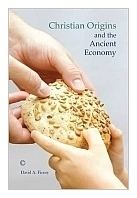|
||
• wydawnictwa polskie
• Zamów informacje o nowościach z wybranego tematu • kontakt
• Cookies na stronie |
CHRISTIAN ORIGINS AND THE ANCIENT ECONOMYFIENSY D.A.wydawnictwo: JAMES CLARKE & CO , rok wydania 2014, wydanie Icena netto: Christian Origins and the Ancient EconomyWhat does economics have to do with Christian origins? Why study such a connection? First of all, the New Testament makes many direct references to economic issues. But, second of all, the economy affects every other aspect of life (family, religion, community, work, health, and politics). How prosperous was first-century Galilee? To understand what it was like to live in a society, one must understand its economy. The study of the economy includes not only the goods and services of the society but also human labor and its control. The study must also take into account how fair the economy was to each family. Those involved in the quest for the historical Jesus have discovered that the ancient economy is a major point of dispute among various interpreters. Was the early Jesus movement a socioeconomic protest? Or was it primarily a religious reform? These two approaches understand Jesus in remarkably different ways. This volume seeks to guide readers through some of the most controversial issues raised in the last twenty years on this important topic. Part One: The Historical Jesus 1 Jesus' Socio-Economic Background 2 Leaders of Mass Movements and the Leader of the Jesus-Movement Part Two: Galilee 3 Jesus and Debts: Did He Pray about Them? 4 The Ancient Galilean Economy: A Model 5 The Nature of the Galilean Economy: The Debate Between the Archaeologists and the Sociologists 6 Did Large Estates Exist in Lower Galilee in the First half of the First Century CE? 7 Assessing the Economy of Galilee in the Late Second Temple Period 8 Domestic Space and Standard of Living Part Three: The Early Church 9 Poverty and Wealth in the Jerusalem Church 10 The Composition of the Jerusalem Church 11 What Would You do for a Living? Bibliography Index 246 pages, Paperback Księgarnia nie działa. Nie odpowiadamy na pytania i nie realizujemy zamówien. Do odwolania !. |


